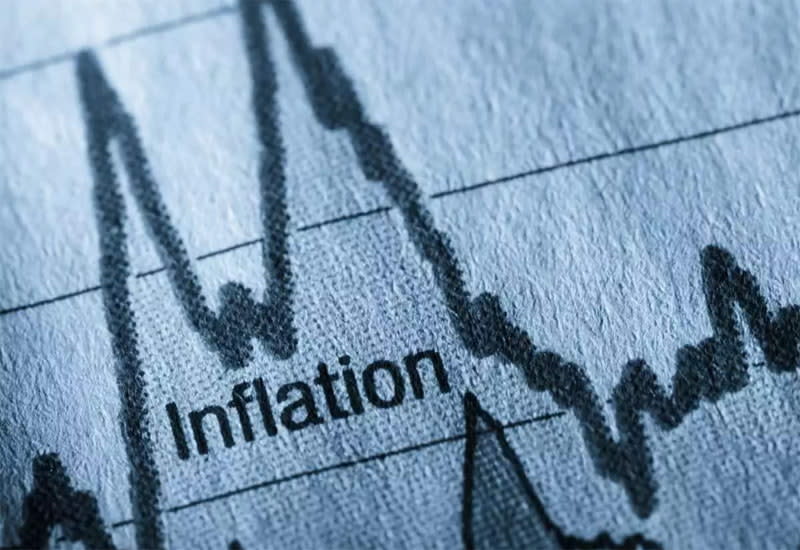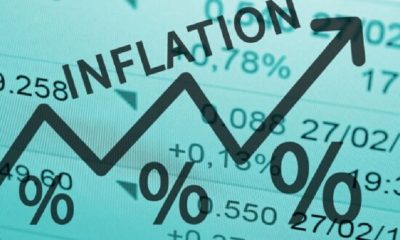Economy
Experts Task Incoming Administration on Inflation, Debt

By Adedapo Adesanya
On Monday, May 29, Nigeria will get a new president as President Muhammadu Buhari will vacate office after eight years for his successor, President-elect Bola Ahmed Tinubu, a transition that comes with a lot of burdens.
Mr Tinubu, a member of Mr Buhari’s All Progressives Congress (APC), was announced by the Independent National Electoral Commission (INEC) as the winner of the February 25 election, defeating Mr Atiku Abubakar of the People’s Democratic Party (PDP) and Labour Party’s Mr Peter Obi.
However, the country faces massive headwinds of problems, including surging inflation and piling debt, which analysts who spoke to Business Post said are the top priority for Mr Tinubu’s administration.
In April, Nigeria’s headline inflation rate increased to 22.22 per cent as it increased by 0.18 per cent compared to the March 2023 headline inflation rate of 22.04 per cent. The NBS said on a year-on-year basis; the headline inflation rate was 5.40 per cent points higher compared to the rate recorded in April 2022, which was 16.82 per cent.
Plans by the country to control inflation and strengthen the Naira have seen interest rates raised for an unprecedented seventh consecutive time.
However, there are yet no signals that inflation will slow anytime soon, meaning the country will likely hike the rate further after research showed the increase in borrowing costs is yielding results.
The monetary policy committee on Wednesday lifted the benchmark rate by half a percentage point to 18.50 per cent, Governor Godwin Emefiele said in Abuja.
With the end in sight, Mr Buhari pleaded with lawmakers to hurriedly approve an $800 million loan from the World Bank, a move that could see Nigeria’s public debt pass $150 billion this year from over $60 billion when he took over.
His borrowing spree has drawn warnings from the World Bank that Africa’s largest economy was using 96 per cent of its revenue to service debts.
Earlier this month, the Budget Office of the Federation told the incoming legislature, which approves the country’s borrowing needs, that Nigeria’s debt-to-revenue ratio was worsening and could spell doom if the country exceeds its limit.
“We now have very limited borrowing space, not because our debt to GDP is high but because our revenue is too small to sustain the size of our debt. That explains our high debt service ratio. Once a country’s debt service ratio exceeds 30 per cent, that country is in trouble, and we are pushing towards 100 per cent, and that tells you how much trouble we are in,” the Director-General of the Budget Office, Mr Ben Akabueze, said.
Speaking to Business Post, Mr Akin Fatunke, a chartered accountant and public affairs analyst, said the country needed the incoming administration to take the bull by the horn.
“Economic viability should be hinged on efficient loan and self-sufficiency management geared towards investments at the commanding heights. West Africa has too many nation-states, many of which are simply not economically viable.
“I look at how Giuseppe Garibaldi masterminded the unification of Italy and how Otto Von Bismarck masterminded the unification of Germany, I look forward to a Nigerian hero masterminding the unification of West Africa,” he said in a correspondence to Business Post.
He tasked the incoming president to “Build a global economic giant that will rival the likes of China and India with their populations that are in excess of one billion people.”
On his part, Mr Nelson Ekujumi, a business and public affairs analyst, was optimistic about the capabilities of the incoming administration, noting that, “The incoming administration as headed by President-elect Asiwaju Bola Tinubu (GCFR) and Vice President-elect Senator Kashim Shettima (GCON) are astute accountant and economist technocrats respectively who are well versed in financial matters and I have a strong optimism that Nigeria’s debt will be tackled.”
He expects them to “plug economic loopholes to generate more sources of revenue that will limit our borrowing and put in place measures to ensure greater productivity and make life affordable and accessible such that the cost of living will be on a manageable scale for a vast majority of Nigerians.
“The factors engendering high cost of living is expected to be tackled frontally to arrest and reduce inflation.”
Economy
Stock Market Gains N2.367trn as All-Share Index Rises 2.06%

By Dipo Olowookere
The Nigerian Exchange (NGX) Limited appreciated by 2.06 per cent on Friday, amid a rush for local equities due to encouraging earnings of companies for 2025.
Business Post reports that the buying pressure was across the key sectors of Customs Street yesterday, with the banking index growing by 2.49 per cent. The energy industry appreciated by 2.05 per cent, the consumer goods counter grew by 0.78 per cent, the insurance space improved by 0.64 per cent, and the industrial goods sector expanded by 0.44 per cent.
At the close of trades, the market capitalisation went up by N2.367 trillion to N117.027 trillion from N114.660 trillion, and the All-Share Index (ASI) gained 3,687.45 points to close at 182,313.08 points compared with the previous day’s 178,625.63 points.
Cornerstone Insurance, Infinity Trust, and Nestle Nigeria appreciated by 10.00 per cent each to sell at N6.38, N9.90 and N2,662.00, respectively, while Okomu Oil rose by 9.99 per cent to N1,327.00, with RT Briscoe up by 9.97 per cent to N17.42.
Conversely, SAHCO depleted by 10.00 per cent to M135.00, Guinness Nigeria lost 9.97 per cent to trade at N103.00, Omatek shrank by 9.39 per cent to N2.99, NPF Microfinance Bank decreased by 6.51 per cent to N5.60, and eTranzact slipped by 6.33 per cent to N10.80.
A total of 53 stocks ended in the green side and 33 stocks finished in the red side, representing a positive market breadth index and strong investor sentiment.
Data showed that 936.4 million shares valued at N52.7 billion were transacted in 50,068 deals on Friday versus the 698.3 million shares worth N28.438 billion traded in 50,886 deals on Thursday, indicating a rise in the trading volume and value by 34.10 per cent, and 85.56 per cent apiece, and a slip in the number of deals by 1.61 per cent.
First Holdco closed the session as the most active equity with 106.3 million units worth N5.1 billion, Zenith Bank transacted 72.6 million units valued at N5.7 billion, United Capital traded 45.4 million units for N963.2 million, GTCO sold 45.0 million units worth N4.9 billion, and Fidelity Bank exchanged 31.4 million units valued at N639.0 million.
Economy
OTC Securities Exchange Extends Positive Run by 0.86%

By Adedapo Adesanya
The NASD Over-the-Counter (OTC) Securities Exchange rose further by 0.86 per cent on Friday, February 13, with the market capitalisation growing by N20.27 billion to N2.378 trillion from the previous session’s N2.357 trillion, and the NASD Unlisted Security Index (NSI) rising by 33.87 points to 3,974.77 points from the 3,940.90 points it ended a day earlier.
The improvement recorded by the bourse yesterday was influenced by six price gainers led by Okitipupa Plc, which went up by N18.00 to sell at N260.00 per share compared with the previous day’s N242.00 per share.
Further, Central Securities Clearing System (CSCS) Plc added N3.39 to quote at N80.47 per unit versus N77.08 per unit, IPWA Plc chalked by 31 Kobo to finish at N3.44 per share versus N3.13 per share, Lagos Building Investment Company (LBIC) Plc gained 31 Kobo to settle at N3.41 per unit versus N3.10 per unit, Afriland Properties Plc appreciated by 31 Kobo to N16.51 per share from N16.20 per share, and Food Concepts Plc increased by 8 Kobo to N3.28 per unit from N3.20 per unit.
There were three price losers, led by MRS Oil Plc, which weakened by N10.00 to close at N170.00 per share compared with Thursday’s price of N200.00 per share, FrieslandCampina Wamco Nigeria Plc lost N2.59 to sell for N65.52 per unit compared with the preceding session’s N68.10 per unit, and Geo-Fluids Plc depreciated by 33 Kobo to N3.30 per share from N3.63 per share.
During the session, the volume of securities transacted by the market participants went up by 9.5 per cent to 9.4 million units from 8.6 million units, the value increased by 1,206.5 per cent to N703.6 million from N53.9 million, and the number of deals grew by 7.1 per cent to 45 deals from 42 deals.
CSCS Plc remained the most traded stock by value (year-to-date) with 27.1 million units exchanged for N1.5 billion, followed by Resourcery Plc with 1.05 billion units traded at N408.6 million, and Geo-Fluids Plc with 29.9 million units valued at N152.6 million.
Resourcery Plc ended the day as the most traded stock by volume (year-to-date) with 1.05 billion units sold for N408.6 million, followed by Geo-Fluids Plc with 29.9 million worth N152.6 million, and CSCS Plc with 27.1 million units sold for N1.5 billion.
Economy
Naira Value Further Dips 0.13% to N1,355/$1

By Adedapo Adesanya
The Naira depreciated further against the United States Dollar by N1.76 or 0.13 per cent on Friday in the Nigerian Autonomous Foreign Exchange Market (NAFEX) to close at N1,33.42/$1, in contrast to the N1,353.66/$1 it was exchanged a day earlier.
However, the Naira appreciated against the Pound Sterling in the same market window yesterday by N5.05 to trade at N1,844.59 versus Thursday’s closing price of N1,849.64/£1, and against the Euro, it improved by 75 Kobo to quote at N1,60/€1 versus the previous day’s N1,608.68/€1.
At the GTBank FX desk, the domestic currency lost N6 on the US Dollar on Friday to settle at N1,365/$1 versus the preceding session’s N1,359/$1, and at the parallel market, it chalked up N10 to trade at N1,430/$1 versus the previous day’s N1,430/$1.
The weakening of the Nigerian currency in the official market happened as the Central Bank of Nigeria (CBN) refrained from intervening in the official window.
The FX supply side was eclipsed by growing demand for foreign payments. Exporters’ inflows, non-bank corporate supply, and other market participants’ contributions had enhanced the FX liquidity level.
Pressure came with the entry of all duly licensed Bureau De Change (BDCs) into the official foreign exchange, although there are indications that the move will help the Naira-US Dollar exchange value, as BDC operators have started approaching their banks to understand the operational modalities and framework for accessing Dollars.
As for the cryptocurrency market, benchmarked tokens improved as US interest rate futures on Friday raised odds of rate cuts by the Federal Reserve after a report that showed inflation rose less than expected in January.
Data showed the Consumer Price Index (CPI) rose 0.2 per cent last month after an unrevised 0.3 per cent gain in December, with Solana (SOL) up by 7.9 per cent to $85.17, and Ethereum (ETH) up by 6.5 per cent to trade at $2,059.78.
Further, Cardano (ADA) added 5.3 per cent to close at $0.2758, Ripple (XRP) jumped 5.1 per cent to $1.42, Bitcoin expanded by 4.8 per cent to $69,357.35, Litecoin (LTC) grew by 4.7 per cent to $55.27, Binance Coin (BNB) jumped 4.0 per cent to $621.88, and Dogecoin (DOGE) increased by 3.8 per cent to $0.0965, while the US Dollar Tether (USDT) and the US Dollar Coin (USDC) remained unchanged at $1.00 each.
-

 Feature/OPED6 years ago
Feature/OPED6 years agoDavos was Different this year
-
Travel/Tourism10 years ago
Lagos Seals Western Lodge Hotel In Ikorodu
-

 Showbiz3 years ago
Showbiz3 years agoEstranged Lover Releases Videos of Empress Njamah Bathing
-

 Banking8 years ago
Banking8 years agoSort Codes of GTBank Branches in Nigeria
-

 Economy3 years ago
Economy3 years agoSubsidy Removal: CNG at N130 Per Litre Cheaper Than Petrol—IPMAN
-

 Banking3 years ago
Banking3 years agoSort Codes of UBA Branches in Nigeria
-

 Banking3 years ago
Banking3 years agoFirst Bank Announces Planned Downtime
-

 Sports3 years ago
Sports3 years agoHighest Paid Nigerian Footballer – How Much Do Nigerian Footballers Earn


















